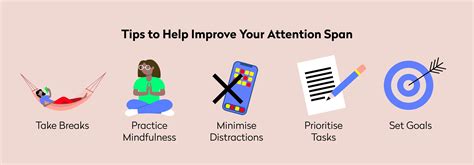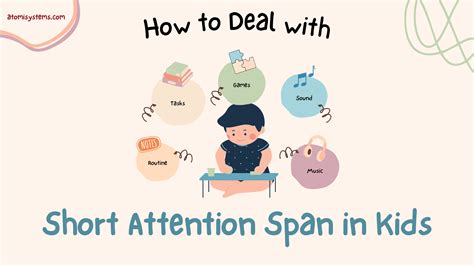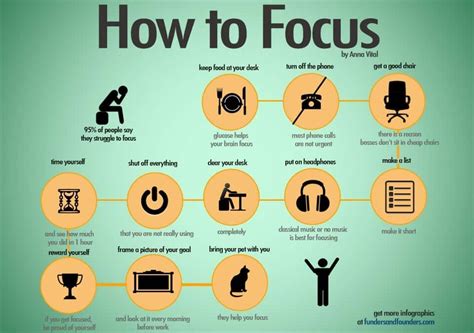Intro
Boost engagement with concise content, tailored to the short attention span, using strategies like bite-sized info, visual aids, and scannable formats to capture fleeting interest and retain audience focus amidst distractions.
In today's fast-paced world, it's becoming increasingly challenging to capture and maintain people's attention. With the constant bombardment of information from various sources, individuals are finding it difficult to focus on one thing for an extended period. This phenomenon is often referred to as a short attention span. The implications of this trend are far-reaching, affecting not only personal relationships but also professional productivity and overall well-being. As we delve into the world of short attention spans, it's essential to understand the underlying causes and consequences of this phenomenon.
The rise of technology, particularly social media and mobile devices, has significantly contributed to the decline in attention span. With an endless stream of notifications, updates, and entertaining content, it's easy to get sidetracked and lose focus. Moreover, the constant need for instant gratification and the fear of missing out (FOMO) can lead to a state of continuous distraction. As a result, people are finding it challenging to engage in activities that require sustained attention, such as reading, learning, or even meaningful conversations. The consequences of this trend are alarming, with potential long-term effects on cognitive abilities, mental health, and relationships.
As we navigate this complex issue, it's crucial to recognize the importance of attention in our daily lives. Attention is the foundation of learning, creativity, and productivity. Without the ability to focus, we risk missing out on valuable experiences, relationships, and personal growth. Furthermore, a short attention span can lead to increased stress, anxiety, and feelings of overwhelm, ultimately affecting our overall quality of life. By understanding the causes and consequences of short attention spans, we can begin to develop strategies to improve our focus, productivity, and well-being.
Understanding Short Attention Span

To comprehend the concept of short attention span, it's essential to explore its definition, causes, and symptoms. A short attention span refers to the inability to maintain focus on a single task or activity for an extended period. This can manifest in various ways, such as difficulty completing tasks, frequent distractions, and an inability to engage in meaningful conversations. The causes of short attention span are multifaceted, including genetic predispositions, environmental factors, and lifestyle choices. By recognizing the underlying causes, individuals can begin to develop strategies to improve their attention span and mitigate the negative consequences.
Causes of Short Attention Span
The causes of short attention span can be broadly categorized into three main areas: genetic, environmental, and lifestyle factors. Genetic predispositions, such as Attention Deficit Hyperactivity Disorder (ADHD), can significantly impact an individual's ability to focus. Environmental factors, including exposure to technology and social media, can also contribute to a short attention span. Lifestyle choices, such as lack of sleep, poor nutrition, and sedentary behavior, can further exacerbate the issue. By understanding the interplay between these factors, individuals can begin to develop targeted strategies to improve their attention span.Consequences of Short Attention Span

The consequences of short attention span are far-reaching, affecting various aspects of life, including relationships, productivity, and mental health. In personal relationships, a short attention span can lead to misunderstandings, conflicts, and feelings of isolation. In professional settings, decreased productivity and lack of focus can result in missed deadlines, poor performance, and decreased job satisfaction. Moreover, a short attention span can increase stress, anxiety, and feelings of overwhelm, ultimately affecting mental health and well-being. By recognizing the potential consequences, individuals can begin to develop strategies to mitigate the negative effects and improve their overall quality of life.
Impact on Relationships
The impact of short attention span on relationships can be significant, leading to misunderstandings, conflicts, and feelings of isolation. When individuals struggle to maintain focus, they may appear distant, uninterested, or unengaged, ultimately affecting the quality of their relationships. Moreover, the constant need for instant gratification and the fear of missing out (FOMO) can lead to an overreliance on technology, further exacerbating the issue. By developing strategies to improve attention span, individuals can strengthen their relationships, foster deeper connections, and improve communication.Improving Attention Span

Improving attention span requires a multifaceted approach, incorporating strategies such as mindfulness, exercise, and lifestyle modifications. Mindfulness practices, such as meditation and deep breathing, can help individuals develop greater self-awareness, reduce distractions, and improve focus. Regular exercise, including aerobic and anaerobic activities, can enhance cognitive function, improve concentration, and boost mood. Lifestyle modifications, such as establishing a consistent sleep schedule, healthy nutrition, and stress management, can further support attention span improvement. By incorporating these strategies into daily life, individuals can begin to develop greater focus, productivity, and overall well-being.
Strategies for Improvement
Several strategies can help improve attention span, including: * Practicing mindfulness and meditation to reduce distractions and improve focus * Engaging in regular exercise to enhance cognitive function and improve concentration * Establishing a consistent sleep schedule to improve cognitive function and reduce fatigue * Eating a healthy, balanced diet to support cognitive function and overall health * Managing stress through relaxation techniques, such as deep breathing and yoga * Limiting exposure to technology and social media to reduce distractions and improve focus * Engaging in activities that promote cognitive stimulation, such as reading, puzzles, and learning new skillsConclusion and Next Steps

In conclusion, short attention span is a complex issue with far-reaching consequences, affecting personal relationships, productivity, and mental health. By understanding the causes, symptoms, and consequences of short attention span, individuals can begin to develop strategies to improve their focus, productivity, and overall well-being. It's essential to recognize that improving attention span requires a multifaceted approach, incorporating strategies such as mindfulness, exercise, and lifestyle modifications. As we move forward, it's crucial to prioritize attention span improvement, fostering a culture that values focus, productivity, and meaningful relationships.
What is the main cause of short attention span?
+The main cause of short attention span is a combination of genetic, environmental, and lifestyle factors, including exposure to technology and social media, lack of sleep, poor nutrition, and sedentary behavior.
How can I improve my attention span?
+Improving attention span requires a multifaceted approach, incorporating strategies such as mindfulness, exercise, and lifestyle modifications, including establishing a consistent sleep schedule, healthy nutrition, and stress management.
What are the consequences of short attention span?
+The consequences of short attention span include decreased productivity, poor performance, and decreased job satisfaction, as well as increased stress, anxiety, and feelings of overwhelm, ultimately affecting mental health and well-being.
We hope this article has provided valuable insights into the complex issue of short attention span. We invite you to share your thoughts, experiences, and strategies for improving attention span in the comments below. By working together, we can foster a culture that values focus, productivity, and meaningful relationships, ultimately improving our overall quality of life.
